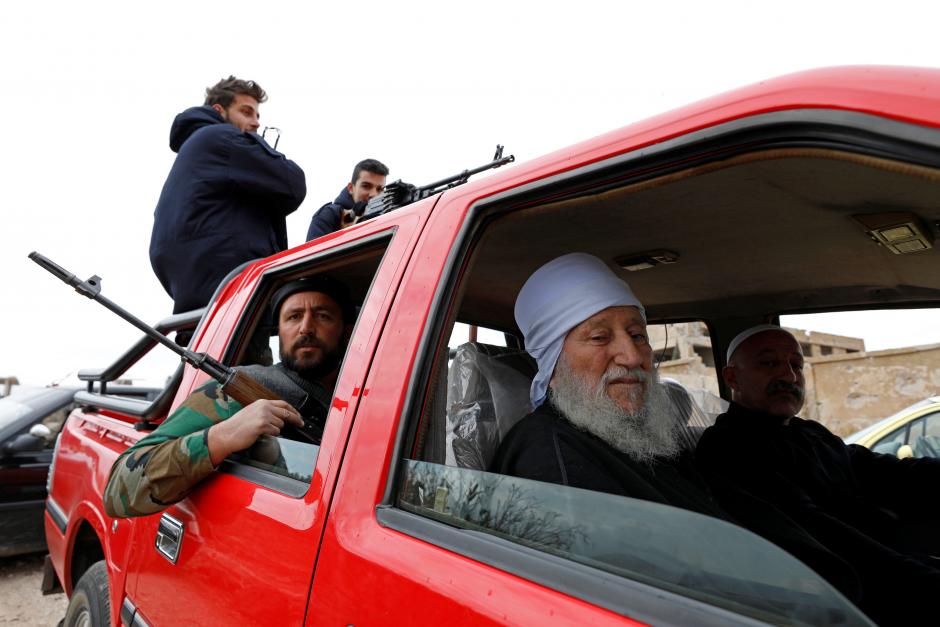Assad regime now hopes to overrun opposition-held Idlib Province in northwest
LATEST
Rebels have begun departure from their last pocket in West Ghouta in southwest Syria, near the Israeli-occupied Golan Heights.
After more than two months of pro-Assad assaults — defying the “de-escalation zone” proclaimed by Russia and the US — rebels and residents agreed to leave the small town of Beit Jinn for opposition-held Idlib Province in northwest Syria and for other opposition territory in the southwest.
Beit Jinn, about 40 km (25 miles) southwest of Damascus, only had about 3,000 residents before the 2011 uprising; however, it lies on a strategic route from the Syrian capital to Lebanon for both the Assad regime’s forces and its ally Hezbollah. Iranian-led foreign militias supported the attacks, but they were headed by some of the regime’s elite units, including the 4th Division.
The Assad regime is hoping to overrun all opposition areas before engaging in political negotiations about Syria’s future. Its largest target — again breaking the supposed de-escalation zones promoted by its essential ally Russia — will be Idlib Province in northwest Syria.
In recent weeks, pro-Assad offensives have re-entered Idlib, almost all of which has been controlled by the opposition since spring 2015. They are pressing for advances in neighboring northern Hama and western Aleppo Provinces, including the Abu Duhour base.
Russia — using the pretext that all the assaults are against the hardline Islamist bloc Hayat Tahrir al-Sham, excluded from the de-escalation agreements — is supporting the attacks with airstrikes.
1st East Ghouta Evacuations Completed, Total of 29 People Moved
The first phase of evacuations of seriously ill people from besieged East Ghouta, near Syria’s capital Damascus, has been completed.
A third group was moved on Friday to Damascus hospitals, bringing the total to 29. A six-month-old girl died before she could be transferred.
The Assad regime has blocked the evacuations for months. It finally relented after Russia and Turkey intervened and rebels agreed to free 29 detainees.
The rest of 29 evacuees (18children, 6 women and 5 men) are out of #Ghouta now heading to Damascus.
11 of the initial approved were replaced with others because 2 died before approval and 9 were scared to go to government areas with no safety guarantees. #BreakGhoutaSiege— Mohamad Katoub (@MhdKatoub) December 28, 2017
The Red Cross and UN are hoping to arrange for the movement of almost 500 people with serious conditions, including almost 170 children suffering from cancer and other ailments. However, the Assad regime has indicated that they will allow transfers if more detainees are released.
The UN’s humanitarian coordinator for Syria, Jan Egeland, expressed concern: “It is not a good agreement if they exchange sick children for detainees. That means children become bargaining chips in some tug of war. That shouldn’t happen”.
East Ghouta has been under siege and bombarded for more than four years. The blockade was tightened this year with the closure of tunnels and the last checkpoint for movement of supplies, putting almost 400,000 people at risk of malnutrition and death from illnesses.
Soon after the evacuations were completed, pro-Assad forces resumed attacks across East Ghouta. White Helmets civil defense volunteers rescue a woman from under rubble after artillery hit residential areas in the town of Misraba:
The @SyriaCivilDefe volunteers rescue a woman from under the rubble after artillery hit residential areas in #Mesraba town, #EasternGhouta pic.twitter.com/t810E3SgiH
— The White Helmets (@SyriaCivilDef) December 30, 2017
The Latest #News || A crazy situation in #EasternGhouta, tens of mortars are being dropped on all of the cities, 60 ones only on #Harasta city with 8 airstrikes on it, and 2 others on #Madyara, each airstrike dropped about 6 to 8 missiles make all the area vibrating.
— Firas Abdullah (@firasabdullah_) December 30, 2017

